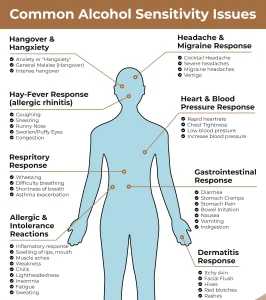Overview
Diagnosis of Alcohol Intolerance or Allergy
In addition to a physical examination, your healthcare professional may recommend specific tests to identify allergic triggers or rule out other conditions.
-
Skin test: A small amount of the suspected allergen (such as grain proteins in beer or sulfites in wine) is placed on your skin. The skin is gently pricked, and if you’re allergic, a raised bump or reaction appears at the site.
-
Blood test: This test measures the immune system’s response to specific allergens. It looks for immunoglobulin E (IgE) antibodies, which indicate an allergic reaction. A sample is sent to a lab to test for reactions to ingredients commonly found in alcoholic beverages.
⚠️ Note: These tests can sometimes give false positives or false negatives, so results should be interpreted by a qualified healthcare provider.
Treatment for Alcohol Intolerance
Currently, there is no cure for alcohol intolerance or allergy. The best approach is to avoid the trigger completely.
-
Avoiding alcohol or specific beverages: If your reaction is triggered by certain ingredients like wheat, barley, sulfites, or histamines, staying away from those drinks can prevent symptoms.
-
Antihistamines for mild reactions: For symptoms such as itching, flushing, or hives, over-the-counter antihistamines may offer quick relief. For stronger allergic responses, a prescription antihistamine may be recommended.
-
Seek medical help for severe symptoms: If you experience difficulty breathing, swelling, or rapid heartbeat after consuming alcohol, get emergency medical care immediately.
Prevention Tips
-
Read labels carefully to check for potential allergens such as sulfites, grains, or flavoring additives.
-
Choose hypoallergenic or low-histamine drinks, if approved by your healthcare provider.
-
Limit alcohol intake or avoid it altogether if symptoms persist.
-
Consult an allergist for proper testing and personalized advice.
Advertisement

